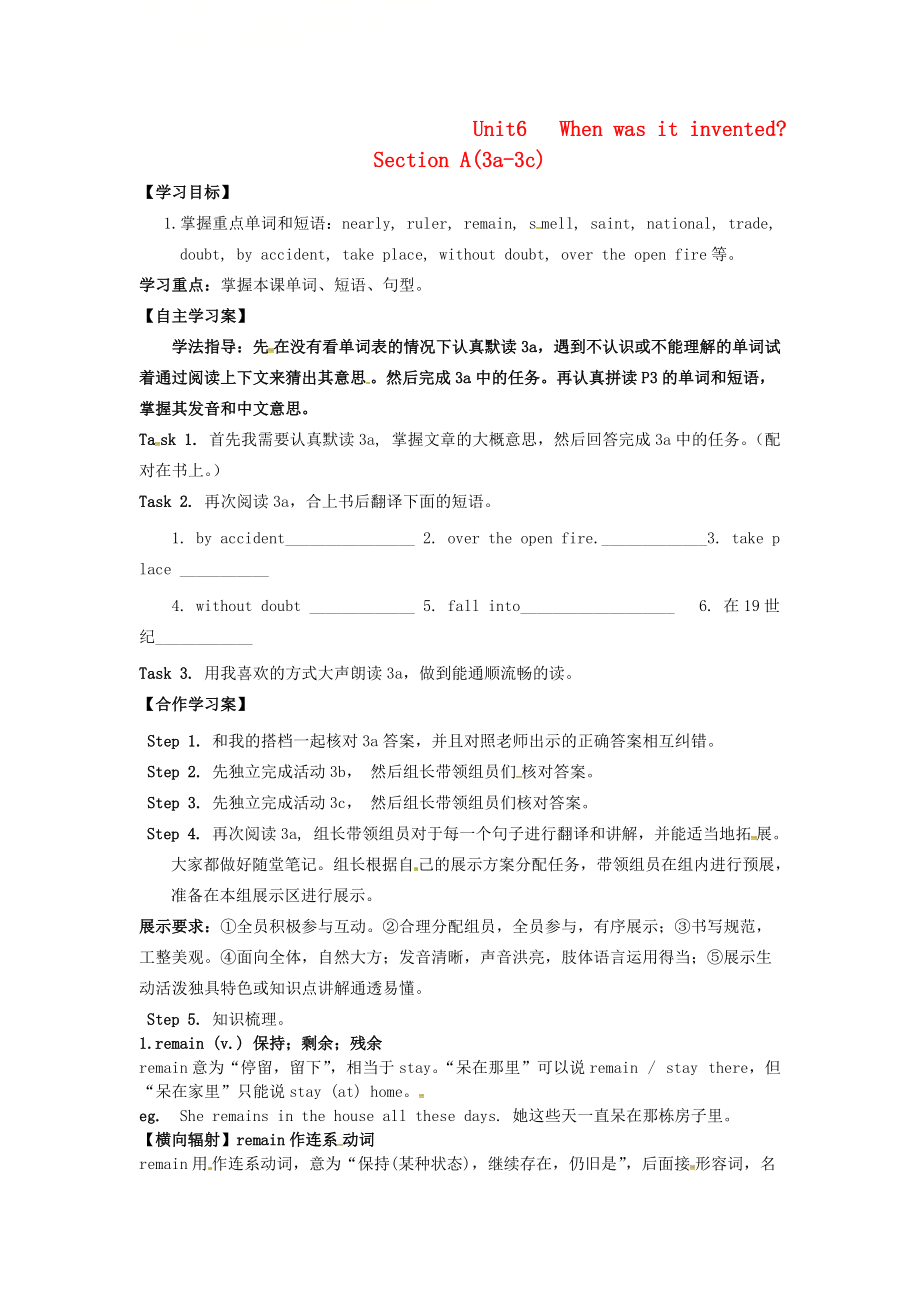《山西省運(yùn)城市垣曲縣九年級(jí)英語全冊(cè) Unit 6 When was it invented Section A3a3c學(xué)案無答案新版人教新目標(biāo)版》由會(huì)員分享�����,可在線閱讀��,更多相關(guān)《山西省運(yùn)城市垣曲縣九年級(jí)英語全冊(cè) Unit 6 When was it invented Section A3a3c學(xué)案無答案新版人教新目標(biāo)版(3頁珍藏版)》請(qǐng)?jiān)谘b配圖網(wǎng)上搜索�����。
1、
Unit6 When was it invented? Section A(3a-3c)
【學(xué)習(xí)目標(biāo)】
1.掌握重點(diǎn)單詞和短語:nearly, ruler, remain, smell, saint, national, trade, doubt, by accident, take place, without doubt, over the open fire等�。
學(xué)習(xí)重點(diǎn):掌握本課單詞、短語��、句型�。
【自主學(xué)習(xí)案】
學(xué)法指導(dǎo):先在沒有看單詞表的情況下認(rèn)真默讀3a,遇到不認(rèn)識(shí)或不能理解的單詞試著通過閱讀上下文來猜出其意思�����。然后完成3a中的任務(wù)��。再認(rèn)真拼讀P3的單詞和
2���、短語��,掌握其發(fā)音和中文意思�。
Task 1. 首先我需要認(rèn)真默讀3a, 掌握文章的大概意思�����,然后回答完成3a中的任務(wù)����。(配對(duì)在書上��。)
Task 2. 再次閱讀3a����,合上書后翻譯下面的短語��。
1. by accident________________ 2. over the open fire._____________3. take place ___________
4. without doubt _____________ 5. fall into___________________ 6. 在19世紀(jì)____________
Task 3. 用我喜歡的方式大聲朗讀3a
3��、�����,做到能通順流暢的讀���。
【合作學(xué)習(xí)案】
Step 1. 和我的搭檔一起核對(duì)3a答案,并且對(duì)照老師出示的正確答案相互糾錯(cuò)�����。
Step 2. 先獨(dú)立完成活動(dòng)3b��, 然后組長(zhǎng)帶領(lǐng)組員們核對(duì)答案���。
Step 3. 先獨(dú)立完成活動(dòng)3c�����, 然后組長(zhǎng)帶領(lǐng)組員們核對(duì)答案��。
Step 4. 再次閱讀3a, 組長(zhǎng)帶領(lǐng)組員對(duì)于每一個(gè)句子進(jìn)行翻譯和講解���,并能適當(dāng)?shù)赝卣?��。大家都做好隨堂筆記。組長(zhǎng)根據(jù)自己的展示方案分配任務(wù)���,帶領(lǐng)組員在組內(nèi)進(jìn)行預(yù)展�����,準(zhǔn)備在本組展示區(qū)進(jìn)行展示��。
展示要求:①全員積極參與互動(dòng)��。②合理分配組員��,全員參與��,有序展示�;③書寫規(guī)范,工整美觀����。④面向全體,自然大方�����;發(fā)音清晰�����,聲音洪亮�,肢
4���、體語言運(yùn)用得當(dāng)����;⑤展示生動(dòng)活潑獨(dú)具特色或知識(shí)點(diǎn)講解通透易懂�����。
Step 5. 知識(shí)梳理��。
1.remain (v.) 保持;剩余�����;殘余
remain意為“停留�����,留下”�,相當(dāng)于stay?�!按粼谀抢铩笨梢哉fremain / stay there��,但“呆在家里”只能說stay (at) home�����。
eg. She remains in the house all these days. 她這些天一直呆在那棟房子里���。
【橫向輻射】remain作連系動(dòng)詞
remain用作連系動(dòng)詞���,意為“保持(某種狀態(tài)),繼續(xù)存在,仍舊是”����,后面接形容詞,名詞�,分詞,不定式或介詞短語�����。
eg. She
5�、remained sitting when they came in.他們進(jìn)來時(shí),她仍然坐著(沒有站起來)�。
eg. Peter became a manager but John remained a worker. 彼得當(dāng)上了經(jīng)理,但約翰仍然是一個(gè)工人���。
eg. Whatever great progress you have made, you should remain modest. 無論你取得了多么大的進(jìn)步,你都應(yīng)一直保持謙虛����。
2. by accident偶然地���;意外地
eg. He made this mistake by accident.他犯這個(gè)錯(cuò)誤純屬偶然
6��、3.not.. until 意為“只到…才…
eg. he didn’t leave until I felt better.只到我感覺好點(diǎn)了���,她才離開���。
【橫向輻射】until的用法
until常用作介詞或連詞,用來引導(dǎo)介詞短語或從句在句子中作時(shí)間狀語�����。
1. 在肯定句中�����,until與延續(xù)性��、持續(xù)性動(dòng)詞連用���,表示“直到……為止”�。
eg. I worked until late in the afternoon. 我一直干到下午很晚的時(shí)候�。
2. 在否定句中,until常與瞬間動(dòng)詞�、短暫性動(dòng)詞連用,表示“直到……才……”��。
eg. The rain didn’t stop
7��、 until midnight. 雨直到半夜才停。
【鞏固訓(xùn)練案】
1. 用單詞drink, nation, with, taste, believe的正確形式填空����。
1. It’s that tea was discovered by ShenLong.
2. When was tea first?
3. your help, I won’t succeed.
4. Tea has become the drink .People all over China drink it.
5. The cake very deli
8、cious.
2. 根據(jù)漢語提示完成下列句子�����。
(1) 中國(guó)與西方國(guó)家的茶業(yè)貿(mào)易發(fā)生于19世紀(jì)����。
The tea trade from China to countries in the century.
(2) 毫無疑問,中國(guó)人最喜歡喝茶���。
����,Chinese like drinking tea best.
(3) 一些葉子掉進(jìn)正在煮沸的飲用水中��。
Some leaves into the boiling water.
(4) 巧克力是偶然發(fā)明的��。
9�����、Chocolate was invented .
(5) 在6世紀(jì)和7世紀(jì)期間�����,茶被帶到日本�����。
Tea to Japan during the 6th and 7th .
3.根據(jù)課文填空����。
Tea is the most popular drink in the world. But to our surprise, it was invented by . It brought to western world 1610, but it was discovered 3,000 years
10、earlier. An Chinese legend says Shen Nong the tea when he was boiling drinking water in the open air. Some from a nearby bush fell into the water and there for some time. And a smell came from the water then. He the mixture and it was wonderful. And in this way, tea was in
11���、vented.
【總結(jié)反思】
這節(jié)課我學(xué)到的新知識(shí)有:________ ____________ _____________________________
這節(jié)課我的不足之處是:
6EDBC3191F2351DD815FF33D4435F3756EDBC3191F2351DD815FF33D4435F3756EDBC3191F2351DD815FF33D4435F3756EDBC3191F2351DD815FF33D4435F3756EDBC3191F2351DD815FF33D4435F3756EDBC3191F2351DD815FF33D4435F375
 山西省運(yùn)城市垣曲縣九年級(jí)英語全冊(cè) Unit 6 When was it invented Section A3a3c學(xué)案無答案新版人教新目標(biāo)版
山西省運(yùn)城市垣曲縣九年級(jí)英語全冊(cè) Unit 6 When was it invented Section A3a3c學(xué)案無答案新版人教新目標(biāo)版

